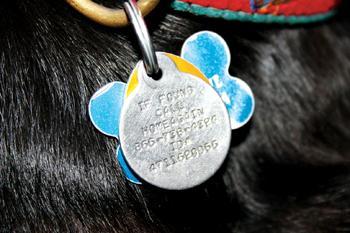Prompted by the thousands of pet owners who lost or abandoned their furry companions during Hurricane Katrina, animal micro-chipping has reemerged into the spotlight. The animal microchips are permanent identification devices, but they do not aid in tracking lost animals. “It’s much easier to prove ownership should your pet be lost or found,” said Armstrong Veterinary Hospital veterinarian Tim Armstrong. After veterinarians inject the grain-sized microchip under the skin between the shoulder blades using a 12 gauge needle, pet owners register the microchip’s unique identification code with a national database. LSU Small Animal Clinic internal medicine technician Holly Carey said the procedure, which costs $21 at the clinic, takes a couple of minutes to complete. She said microchips occasionally migrate from the animals’ shoulder blades to their armpits, but this does not affect their health. “When you scan, you can’t just scan where you put the chip,” Carey said. “You have to scan under the armpits and all around. It doesn’t happen very often, but it does happen.” Carey said it is important to have more than one form of identification. “If you put a collar on a dog, the collar can fall off,” she said. “If someone steals a dog, they can take the collar off. Microchips are permanent.” Alison Hockman, who works at Associated Veterinary Services, fitted her 2-year-old labrador retriever with an animal microchip in March. “I take him hiking a lot, and I was just worried that he would run off chasing after something, so if someone picked him up, he would have some type of ID,” she said. Associated Veterinary Services veterinarian Craig Alberty said his clinic has offered this procedure for ten years. The clinic charges $35 for the microchip, but Alberty said it costs an additional $20 to register the microchip’s code with the manufacturer’s national database. He said he performs two to three microchip procedures per week. Hockman said Associated Veterinary Services has had a few success stories regarding animal microchips. She said a woman reunited with her poodle after she had lost it a year earlier. The dog had been adopted by a family who took it to the vet where it was x-rayed. The veterinarian found a microchip implanted under the dog’s skin and contacted the dog’s original owner. The Louisiana SPCA hosted a special event in New Orleans last weekend that promoted animal microchips and code registration. More than 1,000 dogs and cats were fitted with the devices for $10 each. “People and their pets braved the rain on Saturday and the heat on Sunday,” said Louisiana SPCA volunteer program coordinator Ginger Morvant. Morvant said animals at the SPCA shelter are fitted with microchips before they are adopted. She said she owns an African Grey parrot with a microchip, but not all vets deal with exotic animals and birds. Alberty said the animal micro-chipping was originally used with race horses. He said horse owners used to tattoo the inside of the upper lip to differentiate horses that looked alike. This tradition became obsolete after micro-chipping was introduced because it was easier to inject horses in the neck and scan them for their unique codes. HomeAgain, Avid, Crystal Tag and 24PetWatch are the dominant animal microchip manufacturers. Carey said the LSU Small Animal Clinic uses Avid microchips because it was the only brand available when they first started offering the procedure eight years ago. Armstrong said his clinic, which charges between $36 and $60 for the procedure, chose 24PetWatch because it provides emergency service and an option for pet insurance as well as medical care. “It’s a one-stop-shop, so [pet owners] can access a multitude of services through this one company,” Armstrong said.
_____Contact Angelle Barbazon at abarbazon@lsureveille.com
Microchips help owners find lost pets
July 27, 2006

An ID tag with a number corresponding to an implanted microchip hangs from a Labrador Retriever.



